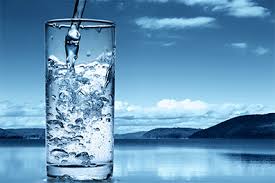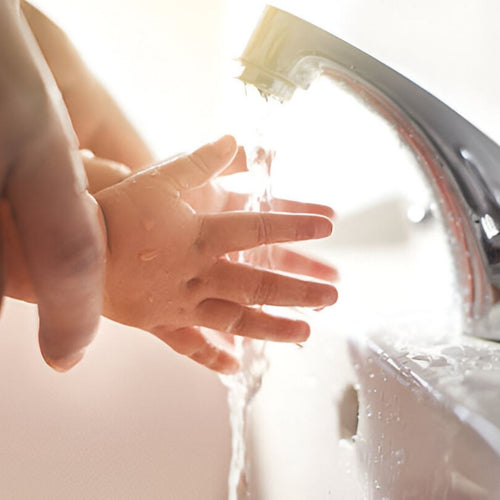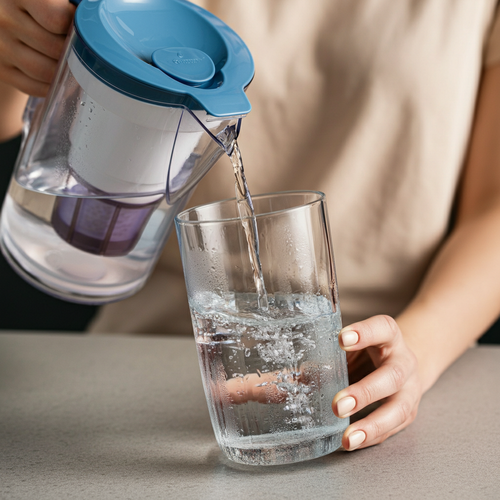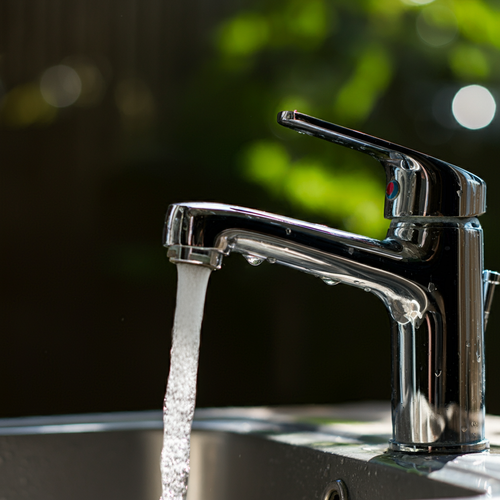Soft water is water that has undergone a treatment process to significantly reduce the concentration of hardness minerals, primarily calcium and magnesium. These naturally occurring minerals are beneficial for our health, but when present in excess within your water supply, they can lead to a number of inconveniences and potential costs.
At SoftPro Water Systems, we understand the frustration that hard water can cause. From mineral buildup in pipes to lackluster laundry and dry skin, hard water presents a number of challenges. But there's a solution! Soft water, achieved through a water softening process, is free of the minerals that cause these problems. Let's delve into what soft water is and how it can transform your home.

What Does Hard Water Feel Like? (Problems Caused by Hard Water)
Have you ever noticed soap scum clinging to your shower walls, even after cleaning? Or perhaps your dishes emerge from the dishwasher with stubborn white spots? These are just a few tell-tale signs that you might have hard water.
Hard water is water with a high concentration of dissolved minerals, primarily calcium and magnesium. These minerals are generally picked up as water percolates through rocks and underground deposits. While these minerals are essential for our health, when they are present in excess in hard water, they can cause a number of problems in your home.
One of the most noticeable effects of hard water is its impact on cleaning. The high mineral content in hard water reduces the effectiveness of soap and detergents. This can lead to:
- Soap scum buildup: Calcium and magnesium react with soap, forming an insoluble film that coats surfaces like shower walls, sinks, and bathtubs.
- Spotty dishes: Hard water minerals can leave residue on dishes after washing, even if a dishwasher is used.
- Reduced lathering: The minerals in hard water can hinder the ability of soap to lather, making it more difficult to clean your hands, body, and hair effectively.
Beyond cleaning challenges, hard water can also have a negative impact on your appliances and plumbing.
- Limescale buildup: Over time, hard water minerals can accumulate and harden inside pipes, water heaters, and other appliances. This buildup, known as limescale, can reduce water flow, decrease appliance efficiency, and shorten their lifespan.
- Clogged showerheads: The tiny holes in showerheads can become clogged with limescale, reducing water pressure and spray distribution.
In severe cases, hard water can even affect your skin and hair. The minerals in hard water can strip away natural oils, leaving skin feeling dry and irritated. Similarly, hard water can make hair feel dry, brittle, and difficult to manage.
Here are two concrete examples of how hard water can be a nuisance:
- Imagine washing your car with hard water. You might go through multiple rinses and still see soapy residue clinging to the paint. This is because the minerals in hard water prevent the soap from rinsing away cleanly.
- Think about boiling water for pasta or tea in a kettle with hard water buildup. Over time, you might notice a layer of white flakes accumulating at the bottom of the kettle. This is limescale, and it can not only affect the taste of your food and drinks but also reduce the kettle's heating efficiency.
How Does Soft Water Compare? (Benefits of Soft Water)
Hard water might seem like an unavoidable inconvenience, but there's a solution: soft water. Soft water has been treated to significantly reduce the concentration of hardness minerals, primarily calcium and magnesium. This reduction in minerals offers a multitude of benefits throughout your home.
Enhanced Cleaning
Soft water allows soap and detergents to lather more effectively, leading to a superior clean. You'll notice:
- Sparkling dishes: Dishes emerge from the dishwasher spotless and gleaming, without the tell-tale white residue left behind by hard water.
- Softer Laundry: Clothes washed in soft water feel softer and cleaner, with less fading and wear and tear over time.
- Reduced Cleaning Products: With soft water, less soap and detergent are needed to achieve a thorough clean. This saves money and reduces the amount of harsh chemicals going down the drain.
Improved Appliance Performance
Soft water is gentler on your plumbing and appliances. By preventing limescale buildup, soft water can:
- Extend Appliance Lifespan: Water heaters, washing machines, dishwashers, and other appliances function more efficiently and last longer when they are not battling hard water buildup.
- Maintain Water Pressure: Reduced limescale buildup in pipes ensures consistent water pressure throughout your home, for better showering and stronger performance from faucets.
- Improve Energy Efficiency: Less limescale buildup in water heaters allows them to operate more efficiently, potentially lowering your energy bills.
Softer Skin and Hair
Soft water can make a noticeable difference in your personal care routine. The minerals in hard water can strip away natural oils, leaving skin feeling dry and irritated. Soft water, on the other hand, is gentler and can help to:
- Hydrate Skin: Soft water allows your skin to retain moisture, leaving it feeling softer and smoother.
- Manage Hair: Soft water can make hair feel more manageable and less prone to frizz.
Here are two concrete examples to illustrate the benefits of soft water:
- Imagine washing your favorite silk blouse. With hard water, the minerals can cause the fabric to stiffen and fade over time. But with soft water, the blouse will maintain its softness and vibrant color for longer.
- Think about showering after a long day. Hard water can leave your skin feeling tight and itchy. But showering in soft water can feel more luxurious, leaving your skin feeling soft and hydrated.
While both hard water and soft water are safe for drinking, soft water offers a number of advantages for your home, appliances, and your personal well-being. In the next section, we'll explore the different ways you can achieve soft water in your home.
How Do I Get Soft Water? (Types of Water Softeners)
Now that you understand the many benefits of soft water, you might be wondering how to achieve it in your own home. The answer lies in water softeners.
A water softener is a plumbing appliance that removes hardness minerals, primarily calcium and magnesium, from your water supply. There are two main types of water softeners:
- Ion-exchange water softeners: This is the most common type of water softener. It uses a resin tank filled with millions of tiny, charged beads. As hard water passes through the tank, the calcium and magnesium ions cling to the beads, while sodium ions (salt) are released into the water. This process essentially replaces the hardness minerals with sodium, leaving the water softened. When the resin beads become saturated with hardness minerals, the system automatically regenerates using a brine solution (saltwater) to clean the beads and recharge them for further softening.
- Salt-free water conditioners: Unlike ion-exchange softeners, these systems do not remove hardness minerals. Instead, they use a process called template-assisted crystallization (TAC) to alter the way the minerals crystallize. This modification prevents the minerals from sticking to pipes and appliances, reducing limescale buildup. However, salt-free conditioners are generally less effective than ion-exchange softeners at addressing all the problems caused by hard water, particularly soap scum and reduced cleaning efficacy.
Here's a table summarizing the key differences between ion-exchange water softeners and salt-free water conditioners:
| Feature | Salt-Free Water Conditioner | |
| Process | Removes hardness minerals | Alters hardness mineral crystallization |
| Effectiveness | Highly effective for all hard water problems | Moderately effective, may not address soap scum or cleaning issues |
| Maintenance | Requires periodic salt regeneration | Generally maintenance-free |
| Cost | Higher upfront cost | Lower upfront cost |
| Salt Usage | Uses salt for regeneration | No salt required |
Choosing the Right Water Softener
The best type of water softener for your home depends on several factors, including the severity of your hard water problem, your budget, and your environmental concerns.
- If you have very hard water and want the most comprehensive solution, an ion-exchange water softener is the way to go.
- If you have moderately hard water, a salt-free conditioner might be a viable option, especially if you are on a tight budget or have concerns about sodium intake.
Additional Water Softening Technologies
While ion-exchange and salt-free conditioning are the most common methods, there are other, less prevalent water softening technologies available, such as reverse osmosis (RO) systems. These systems use a semi-permeable membrane to remove a wide range of contaminants, including hardness minerals, from your water supply. However, RO systems are typically more expensive and can waste a significant amount of water in the process.

Should I Invest in a Water Softener? (Deciding Factors)
Soft water offers a multitude of benefits for your home, appliances, and even your skin and hair. But is a water softener the right investment for you? Here are some key factors to consider.
Water Hardness
The severity of your hard water problem is a crucial deciding factor. A simple home water hardness test (https://wqa.org/) can reveal the level of hardness minerals in your water supply. Extremely hard water (greater than 17 grains per gallon (gpg) or 270 parts per million (ppm)) will likely warrant a water softener for maximum benefit. With moderately hard water (7-17 gpg or 120-270 ppm), you might consider a salt-free conditioner or weigh the potential benefits of a softener against the cost.
Impact on Your Home
Think about the problems you're currently experiencing with hard water. Is limescale buildup a major issue in your pipes and appliances? Do you struggle with soap scum and cleaning residue? If hard water is causing significant inconveniences and potentially reducing the lifespan of your appliances, a water softener can be a worthwhile investment.
Cost vs. Benefits
Water softeners require an upfront cost for the equipment and installation. There are also ongoing costs associated with salt usage (for ion-exchange models) and maintenance. However, these costs can be offset by the potential savings on cleaning products, reduced need for appliance repairs or replacements, and improved energy efficiency.
Environmental Impact
Ion-exchange water softeners use salt for regeneration, which can add sodium to your wastewater. If you have environmental concerns, a salt-free conditioner might be a preferable option. Alternatively, there are water-efficient water softeners available that use less salt for regeneration.
Salt Intake Concerns
While soft water itself doesn't contain significant amounts of sodium, the regeneration process in ion-exchange softeners adds some sodium to the water. This is generally not a concern for healthy individuals. However, if you are on a sodium-restricted diet, you might want to discuss this with your doctor before installing a water softener. They can advise you on the potential impact and recommend alternative water treatment options if necessary.
Here are two concrete examples to illustrate the decision-making process:
- Imagine a family living in a house with extremely hard water. They constantly battle limescale buildup in their pipes and appliances, and their laundry feels rough and dingy. In this case, a water softener would likely be a wise investment to improve the efficiency and lifespan of their appliances, make cleaning easier, and provide softer, more comfortable laundry.
- Consider a couple living in an apartment with moderately hard water. They notice some occasional soap scum buildup, but it's not a major issue. They are also on a tight budget. In this scenario, a salt-free conditioner might be a more cost-effective option to address the mild hard water problems without a significant upfront investment.
Understanding Hard Water vs Soft Water
Throughout this article, we've explored the world of hard and soft water. Hard water, with its high mineral content (primarily calcium and magnesium), can cause a range of problems for homes, including inefficient appliances, cleaning difficulties, and even dry skin and hair. Soft water, treated to reduce these minerals, offers a solution to these issues, providing benefits that extend from cleaner laundry to longer-lasting appliances and improved comfort.
Key Takeaways:
- Soft water addresses hard water problems: From limescale buildup to spotty dishes and lackluster hair, switching to soft water can solve common hard water frustrations and simplify your daily routines.
- Investment in efficiency: Water softeners improve appliance performance and lifespan, potentially lowering utility bills and extending the life of your household appliances.
- Enhanced cleaning power: Improved soap lathering and detergent effectiveness mean clean dishes, brighter laundry, and less need for harsh cleaning chemicals.
- Personal comfort: Say goodbye to dry skin and unmanageable hair. Softer water leaves skin feeling soft and promotes healthier hair.
- Determining the need: The severity of your hard water problem, home and lifestyle considerations, and potential environmental concerns all factor into deciding if a water softener is right for you.
Does hard water affect your daily life?
Take the first step to optimize your home with a simple hardness test. Understanding your water quality is key to making an informed decision about investing in the comfort and convenience of soft water.


















![Aldex Premium 10% Cross Link Resin for Water Softener [High Capacity]-SoftPro® Water Systems](http://www.softprowatersystems.com/cdn/shop/files/Aldex_10_Cross_Link_Resin_Premium_High_Capacity_for_Water_Softener_600x.jpg?v=1735853599)





















